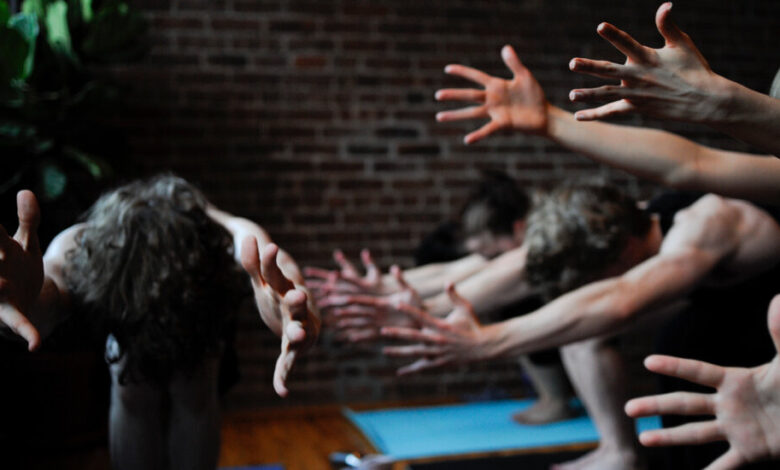Yoga Chain Reaped Millions but Filed No Taxes for Years, Prosecutors Say

Yoga to the People began as a small studio in Manhattan’s East Village, where students merely paid an optional donation — the amount was up to them — to practice pranayamas and downward-facing dogs in classes that appealed to the city’s hip, fit and budget conscious.
It became a New York institution, with a cadre of faithful students and teachers, and soon grew into a nationwide chain operating in half a dozen states. But on Wednesday, federal prosecutors said it was also a criminal enterprise that its founders used to rake in millions of dollars that for seven years went unreported to the Internal Revenue Service.
The arrest of the yoga empire’s founders and co-owners — Gregory Gumucio, Michael Anderson and Haven Soliman — was the latest cloud over the once-popular chain, which closed in 2020 after it was rocked by allegations of racial discrimination, questionable business practices and sexual assault by more than two dozen former students and employees.
The co-owners were arrested in Washington State and each charged with one count of conspiracy to defraud the I.R.S. and five counts of tax evasion, according to a statement from the United States Attorney’s Office for the Southern District of New York. Prosecutors said the defendants went to great lengths to conceal their income, which was not reported to the I.R.S. from 2013 through 2020.
“The defendants perpetrated their scheme in various ways, including paying employees in cash and off the books, refusing to provide employees with tax documentation, not maintaining books and records, paying personal expenses from business accounts and using nominees to disguise their connection to various entities,” Damian Williams, the U.S. attorney for the Southern District of New York, said in a statement. “At least two of the defendants even submitted fabricated tax returns to third parties when seeking a loan or an apartment, despite not filing any tax returns with the I.R.S.”
Lawyers for Mr. Gumucio, Mr. Anderson and Ms. Soliman could not immediately be reached for comment on Wednesday.
Founded in 2006, Yoga to the People achieved wild success and enviable buzz at its height.
Its instructors in the early years included a Swedish reality star, Sofia Kristina Hellqvist, who dated Mr. Gumucio and later married into the nation’s royal family in 2015, becoming Princess Sofia, duchess of Värmland. Hilaria Baldwin, the social media influencer and wife of the actor Alec Baldwin, also taught at the company before opening her own studio in 2010.
But the donation-only, pay-what-you-can structure of Yoga to the People, where students would fish around in bags for cash in a laid-back, no-frills studio, was pivotal to the founder’s fraud at the heart of the business, prosecutors said.
Donations were deposited into tissue boxes passed from student to student, like a collection plate at church, prosecutors said, and accused the organization of paying teachers off the books and in cash, too.
But teachers were forbidden from counting the money. In New York, the cash was instead brought to Mr. Gumucio’s home on St. Marks Place in Manhattan, where the bills were counted and stacked at what he called “stacking parties,” prosecutors said.
Teachers themselves were also an important revenue stream. As is the case for many yoga and Pilates studios, Yoga to the People’s teaching training program was a reliable source of income for the business. Offered a few times a year, it cost dozens of aspiring teachers roughly $3,000 each.
The business also did not maintain a corporate headquarters or keep financial records, and the three founders used its bank accounts to pay for their personal expenses, prosecutors said.
Mr. Gumucio was often on the wrong side of the law as a young man. He pleaded guilty to second-degree forgery in 1982, and to theft the following year. He identified himself using aliases like Charles Abbot, Richard Clayton and Paul R. Smith Jr., records show.
In 1986, he was charged with an attempted escape from law enforcement custody in Colorado and sentenced to six years behind bars, records show, but it is unclear how much time he actually served. That same year, he pleaded guilty to motor vehicle theft.
In 2004, a woman in Washington State accused him of rape, but the case was closed when she stopped cooperating with investigators.
In 2020, former students and employees began to share an avalanche of complaints against Mr. Gumucio online. They accused him of sexually preying on teachers and students, using racial slurs in the workplace, discriminating against employees of color, failing to use tax forms and encouraging teachers to conceal their income. The allegations were first reported by Vice News.
The financial crimes that each co-owner stands accused of reflect some of those allegations. Prosecutors said Mr. Gumucio “targeted and groomed typically young women and others” to become owners of new studios in name only. They assumed financial risk for a branch even though he controlled its business decisions and took a cut of its proceeds.
Prosecutors also said that Mr. Gumucio manipulated his employees into working for free to lower his costs and maximize his income. Some of the tasks he pressured them to perform included cleaning yoga studios, stacking piles of money at his apartment, depositing the cash into bank accounts for him and even teaching classes without compensation.
In court documents filed on Wednesday, prosecutors outlined each co-founder’s spending to detail what they said were the fruits of these efforts.
For example, they said bank records showed that Ms. Soliman spent more than $48,000 in 2017 and 2018 on her horses, which included fees for shows, a “horse lease,” boarding and shoes. From 2015 to 2020, Mr. Gumucio’s credit card statements showed more than $269,000 spent on flights, more than $75,000 spent on hotels, more than $39,000 spent at restaurants and more than $30,000 each spent at country clubs and on event tickets.
He also used Yoga to the People’s bank accounts to pay more than $158,000 in personal credit card bills during that time, prosecutors said.
Jan Ransom and Katherine Rosman contributed reporting.




